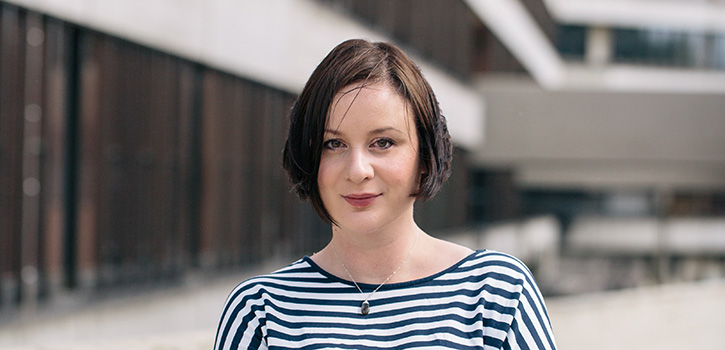As the New Generation Thinkers scheme celebrates its 10th anniversary, Dr Katherine Cooper, a UEA researcher, reflects on her early career steps made during the scheme back in 2016.

Since launching in 2011, the New Generation Thinkers (NGT) scheme has seen a 100 of the brightest researchers take their first steps in communicating their work to broader audiences, using various media outlets.
Led by BBC Radio 3 and the Arts and Humanities Research Council (AHRC), the scheme provides significant support and training to ten researchers every year. With an aim to increase public engagement, the scheme helps to bring research to life in radio and television productions set for the likes of BBC Radio 4 and BBC World Service.
Among the 100 researchers who have made their way through the scheme are three successful UEA researchers, including Senior Research Associate in the School of Literature, Drama and Creative writing, Katherine Cooper. Taking part back in 2016, Katherine recently shared why the scheme was a real game changer for her, the various ways it’s helped to amplify her research to new heights and why fellow researchers should consider applying this year.
Could you tell us a little bit about your research?
My research focuses on the intersections between war, nation and Europe in literary culture of the mid-twentieth century. I’m interested in how these ideas intersect in writers' work and how they inform their experiences of war and their hopes for the post-war world.
I’m particularly interested in how ideas cross borders and communities of letters which operate internationally and through international organisations. My next book looks at how British writers like H.G. Wells helped refugee writers escape occupied Europe in World War Two.
What opportunities have you had as a result of New Generation Thinkers?
I’ve said this many times before but the New Generation Thinkers scheme was a real game changer for me. At the time, I’d been out of my PhD for some time and had been struggling to get a permanent post, so it was a huge boost to my confidence.
As a result of it I’ve performed at Hay Festival, made numerous radio programmes, made a film about buying Storm Jameson’s desk, judged the AHRC Research in Film Awards and become part of a really lovely cohort of other NGTs. I’ve even done media training for people at various institutions!
Highlight of the scheme?
That is tough, there have been so many. I suppose that it was performing at the Free Thinking Festival at Sage Gateshead (I’m from Newcastle) with my mum and dad and all their friends and neighbours in the audience, as well as lots of former colleagues from Newcastle University. It was a live recording and interview too, so no pressure at all!
Although for sheer adrenaline, being ‘unveiled’ as a New Generation Thinker live on stage on a beautiful hot day at Hay is pretty tricky to top, we’d had to keep it a secret up until that point!
What have you personally gained from being part of the scheme?
The most important gain has been that it’s taught me where I want to place myself as an academic. I know that there is a certain amount of resistance to this in the academy, but it’s made me realise that I am actually really suited to this kind of work and that I want my research to be read widely.
I’m really committed to this idea of making research accessible and of finding better ways of telling people about it because I think that this is really important for society, particularly in a climate that runs down so much of what we do in universities and in the humanities in particular. So it’s changed my career trajectory and the way that I see myself progressing both within and beyond HE in a really significant way.
With 2021 applications about to open, why should people consider applying and what advice would you give them?
Absolutely people should apply. It’s a phenomenal scheme which gives you so many opportunities in terms of your career. But from a personal perspective it also enables you to work with these incredibly talented people at the BBC (I sometimes feel that they know more about my research than I do!) who will help you to bring it to a much wider audience in ways that you’d never thought of.
Katherine is one of three UEA academics to have been accepted onto the scheme, with Emma Griffin and Adriana Sinclair both joining the scheme in 2012.
Interested in joining the scheme? Applications for 2021 have just opened. If you would be interested in applying, please visit the New Generation Thinkers website for more details.
More from the UEA Community Blog: 'Hope is sometimes just a page away'
No results, try changing your search criteria
No results, try changing your search criteria

:focus(1831x1171:1832x1172))